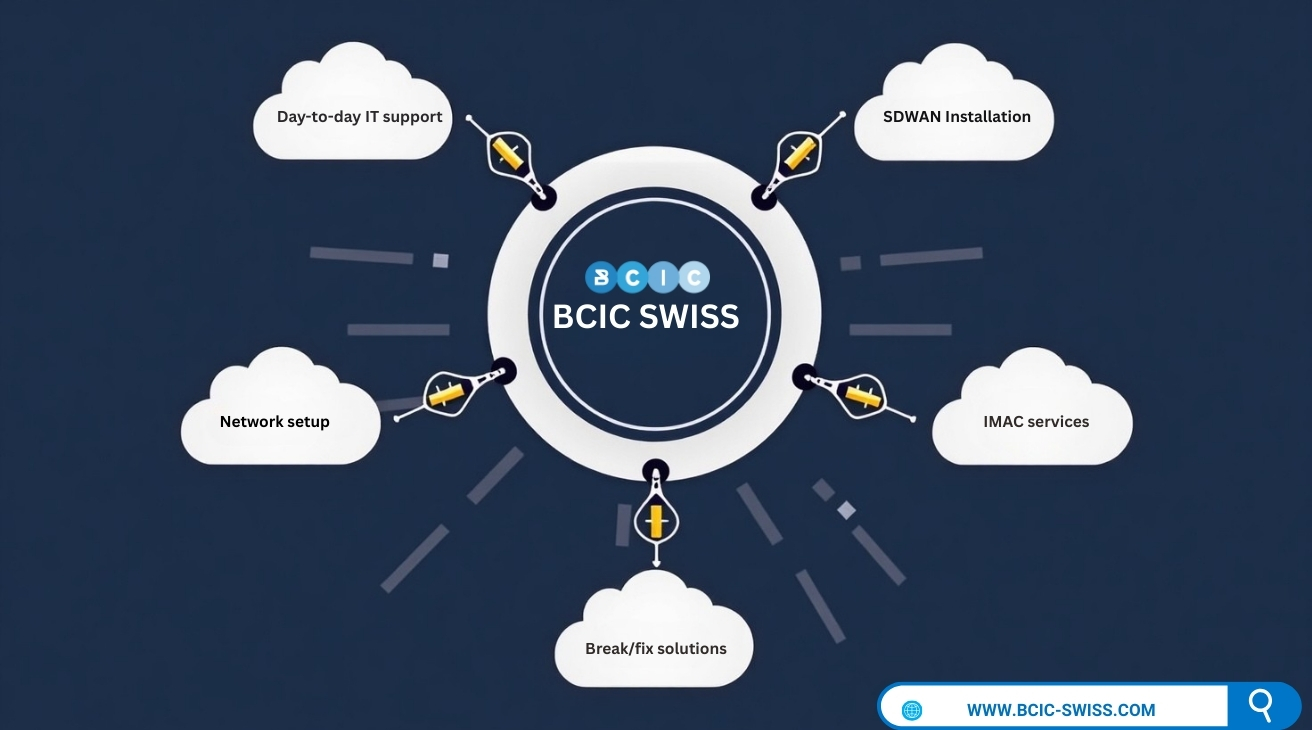Onsite Engineer Services | Europe Market
Onsite engineer services have been instrumental in bridging the gap between technological challenges and operational efficiency. Consider that businesses can save up to 12% in downtime costs by having an onsite engineer available. This direct support translates to swift problem solving and increased productivity.
Historically, the need for onsite engineer services surged as industries recognized the value of immediate technical support. Today, an estimated 90% of companies with complex infrastructures rely on these services. Their presence ensures timely resolutions, minimizes disruptions, and keeps operations running smoothly.
Onsite engineer services provide immediate technical support, ensure system maintenance, handle installations and configurations, and implement security measures. They help minimize downtime, enhance productivity, and address complex IT issues directly at the business location. These services are crucial for maintaining efficient and secure operations in modern enterprises.
Exploring Onsite Engineer Services
Onsite engineer services play a vital role in maintaining efficient operations within an organization. They provide immediate technical support, addressing issues that arise on the spot. This reduces downtime and helps keep business processes running smoothly. Many companies rely on these services for their day-to-day operations. The accessibility and expertise of onsite engineers make them a valuable asset.
An onsite engineer's responsibilities cover a wide range of tasks. They handle network installation, IMAC (Install, Move, Add, Change), and break/fix solutions. These professionals also provide expert support in troubleshooting and system management. Their presence ensures timely resolutions to technical problems. Having an onsite engineer can greatly enhance a company's productivity and operational efficiency.
Various industries have realized the advantages of employing onsite engineers. For instance, the healthcare sector benefits from their expertise in managing critical IT systems. Similarly, manufacturing plants rely on onsite engineers to upkeep their automated processes. Educational institutions and financial services also benefit from prompt onsite support. The versatility of onsite engineers makes them suited for many sectors.
Choosing the right onsite engineering service provider is crucial. Look for a service that offers comprehensive IT support solutions. Providers like bcic swiss offer managed services, including onsite support across Germany and Switzerland. They ensure clear pricing with no hidden fees and offer everything under one roof. Their 24/7 monitoring and remote support complement the onsite services, providing a complete IT solution.
The Scope and Definition
The scope of onsite engineer services encompasses a variety of tasks aimed at maintaining and optimizing IT infrastructures. These services include installing and configuring hardware, troubleshooting issues, and ensuring consistent performance. Onsite engineers also handle network setup and management, making them indispensable for seamless operations. Their role extends to providing training and support to staff. This comprehensive involvement helps businesses function without technical disruptions.
Onsite engineer services can be defined as specialized assistance provided directly at the client's location. This hands-on approach allows engineers to quickly diagnose and resolve problems. It contrasts with remote services that may delay troubleshooting. Onsite engineers are equipped to handle urgent and complex issues. Their presence ensures better communication and faster problem resolution.
The definition of onsite engineer services is broad and adaptable. They cater to various organizational needs, from small businesses to large enterprises. Industries such as healthcare, education, and manufacturing frequently utilize these services.
-
Immediate technical support
-
Installation and configuration
-
Network setup and management
-
Staff training and assistance
The versatility of onsite engineers makes them a crucial part of modern IT solutions.
Understanding the scope involves recognizing the multiplicity of functions an onsite engineer performs. They are not just troubleshooters but also proactive managers of IT systems. Onsite engineers play a crucial role in preventive maintenance. They regularly monitor and update systems to avoid future issues. This proactive approach reduces downtime and enhances overall efficiency.
Significance of Onsite Services in Modern Businesses
Onsite services have become essential in modern businesses, providing immediate support and expertise. With the growing complexity of technology, having an onsite engineer ensures quick resolutions to IT issues. These services help maintain business continuity and reduce downtime. Whether it’s a startup or an established company, onsite support is invaluable. It keeps operations running smoothly and efficiently.
The significance of onsite services extends to enhancing productivity. By addressing technical problems promptly, the workforce can remain focused on their tasks. This reduction in downtime translates to increased job satisfaction and morale. Employees feel supported knowing help is readily available. Onsite engineers contribute significantly to a robust working environment.
Modern businesses are increasingly reliant on their IT infrastructure. Any disruption can lead to substantial financial losses and operational hiccups.
-
Minimized downtime
-
Enhanced productivity
-
Immediate technical support
-
Increased employee satisfaction
Having onsite services mitigates these risks and ensures smooth functioning. The expertise provided by onsite engineers is crucial for maintaining and improving IT systems.
Furthermore, businesses benefit from a strategic approach to IT management. Onsite engineers can proactively identify potential issues before they become significant problems. They help in implementing best practices and keeping systems updated. This preventive maintenance is key to avoiding disruptions. Onsite services, therefore, play a pivotal role in the long-term success of modern businesses.
Core Functions of Onsite Engineers
Onsite engineers perform a range of essential tasks to keep IT systems operational. Their primary role is to troubleshoot and resolve hardware and software issues. This immediate support is crucial for maintaining business continuity. Engineers often have to diagnose problems quickly and implement effective solutions. Their presence ensures that technical disruptions are minimized.
Another core function is the installation and configuration of IT equipment. This includes setting up new computers, servers, and network devices. They ensure that all hardware is correctly installed and functioning efficiently. They also configure systems to meet the specific needs of the organization. This setup ensures that the technology infrastructure runs seamlessly.
Onsite engineers are responsible for maintaining and upgrading existing systems. Regular maintenance helps prevent unexpected failures and extends the lifespan of equipment.
-
Software updates
-
Hardware inspections
-
Performance optimizations
Upgrades involve keeping the company's technology current and capable of handling new tasks. These activities are vital for long-term IT stability.
Providing user support and training is another key responsibility. Onsite engineers assist employees with various technical issues, enhancing productivity. They also conduct training sessions to help staff understand new software or hardware. This education empowers users to work more efficiently. Their support is instrumental in ensuring that employees can utilize technology effectively.
Onsite engineers also play a role in network management. They handle tasks such as setting up and maintaining secure networks. This includes configuring firewalls, routers, and switches. Ensuring network security is a critical aspect of their job. Their efforts protect the company's data and prevent unauthorized access.
Moreover, they assist in creating and implementing disaster recovery plans. This preparation is essential to protect data and ensure business continuity in case of a disaster. They help test these plans to guarantee their effectiveness. Onsite engineers make sure that the organization is ready to face any challenges. Their comprehensive support systems are vital for the resilience and security of IT infrastructure.
Challenges Addressed by Onsite Engineer Services
Onsite engineer services address numerous challenges businesses face daily. One of the most significant is rapid response to IT emergencies. Downtime can lead to substantial financial losses and operational setbacks. Onsite engineers minimize this downtime by providing immediate support. Their presence ensures that issues are resolved quickly and efficiently.
Network stability is another major challenge. Onsite engineers ensure that networks run smoothly and securely. They troubleshoot connectivity issues, configure network devices, and manage traffic.
-
Network interruptions
-
Slow connections
-
Security breaches
Thus, they maintain optimal network performance, which is critical for business operations.
Hardware and software compatibility issues can disrupt productivity. Onsite engineers help with the installation and configuration of new equipment and software updates. They make sure that all components work together seamlessly. Their expertise prevents compatibility issues that could cause delays. This smooth integration is essential for a functional and efficient IT environment.
Data security and recovery pose significant challenges. Onsite engineers implement and manage robust security measures to protect against cyber threats. They also establish and test disaster recovery plans. Security Measures Recovery Plans Firewall setup Regular backups Anti-virus software Recovery drills These efforts ensure that data integrity is maintained, and recovery is swift in the event of a breach or disaster.
User support and training are essential but challenging aspects. Onsite engineers provide hands-on assistance and training to staff. They help employees overcome technical difficulties and improve their skills. This support boosts overall productivity and confidence in using IT resources. Having accessible and knowledgeable engineers on-site makes a significant difference.
Lastly, maintaining system performance is always a challenge. Onsite engineers perform regular maintenance and updates to keep systems running efficiently. This proactive approach helps in identifying potential issues before they become critical. Consistent system performance is vital for the smooth operation of any business. Onsite engineers ensure that IT infrastructure remains robust and reliable.
Key Benefits of Engaging Onsite Engineers
Engaging onsite engineers offers numerous advantages for businesses. One of the foremost benefits is the immediate resolution of IT issues. Having an engineer on-site ensures that problems are swiftly diagnosed and fixed. This rapid response minimizes downtime. Reduced downtime translates to increased productivity and operational efficiency.
Onsite engineers provide personalized support tailored to the specific needs of the business. They understand the unique technical requirements of their clients.
-
Customized solutions
-
In-depth knowledge of the business
-
Consistent and reliable support
This personalized approach enhances the overall IT experience. Businesses receive the exact support they need when they need it.
Security is another significant benefit of engaging onsite engineers. Having a dedicated engineer ensures that all security protocols are followed diligently. They can implement and manage security measures like firewalls and anti-virus software. Onsite engineers also conduct regular security audits. This proactive approach helps in protecting sensitive data and preventing breaches.
Onsite engineers also play a crucial role in maintaining and upgrading IT infrastructure. They handle regular maintenance tasks and ensure systems are up-to-date. Task Frequency System updates Monthly Hardware inspections Quarterly Performance tuning As needed These activities keep the infrastructure running smoothly. Consistent maintenance helps in preventing major issues down the line.
Employee productivity and satisfaction also see a boost with onsite engineers. They provide immediate assistance, allowing employees to stay focused on their work. Training sessions conducted by onsite engineers help staff keep up with new technologies. This support is invaluable in maintaining a high level of productivity. Staff feels confident and supported, leading to increased job satisfaction.
Engaging onsite engineers provides a strategic advantage for long-term IT planning. They assist in developing and implementing IT strategies aligned with business goals. Onsite engineers help in identifying areas for improvement and innovation. Their expertise ensures that the IT infrastructure evolves with the business. This proactive planning is crucial for sustaining growth and competitiveness.
Case Studies: Effective Onsite Engineering Solutions
A retail company faced frequent network outages affecting sales operations. Onsite engineers were called in to assess and stabilize the network. They identified faulty hardware causing intermittent connectivity. By replacing the components and optimizing settings, they restored reliability. The company saw a 30% increase in uptime, boosting overall productivity.
In a healthcare facility, outdated systems were slowing down administrative tasks and patient care. Onsite engineers implemented a full system upgrade, including new servers and software updates.
-
Modernized hardware
-
Updated software systems
-
Enhanced data security measures
The improvements led to faster processing times and more secure patient records. Staff reported increased efficiency in their daily functions.
An educational institution struggled with integrating new educational software across its various campuses. Onsite engineers provided customized training sessions for teachers and technical staff. They also ensured compatible devices and set up proper network configurations. This intervention enabled seamless software use, enhancing the learning experience for students.
A financial firm needed robust data protection solutions to comply with regulatory standards. Onsite engineers established stringent security protocols and regular backup routines. Security Measure Description Firewall Setup Protects against unauthorized access Data Encryption Ensures confidentiality of sensitive information Regular Backups Keeps data safe from unforeseen losses These measures brought the firm in line with industry standards while minimizing risks associated with data breaches.
A manufacturing plant dealt with frequent production halts due to IT equipment failures. Onsite engineers conducted an extensive evaluation of their current systems.
-
Scheduled maintenance checks
-
Troubleshooting existing problems
-
Implementing immediate repairs Their efforts not only resolved ongoing issues but also put preventive measures in place. This proactive strategy led to smoother production processes and reduced downtime significantly. These case studies highlight the critical impact of effective onsite engineering solutions.
Comparative Analysis: Onsite vs Remote Support
Onsite support provides immediate, face-to-face assistance, which is ideal for critical and complex technical issues. Engineers can quickly diagnose hardware problems and provide hands-on solutions. This direct interaction often leads to faster problem resolution. The presence of an onsite engineer helps staff feel more supported. However, onsite support can be more expensive due to travel and time costs.
Remote support, on the other hand, offers convenience and cost-effectiveness. Support professionals can handle issues from any location, leading to quicker response times for non-critical problems. This type of support is usually less costly since it eliminates the need for travel. Aspect Onsite Support Remote Support Response Time Immediate for critical issues Quicker for non-critical issues Cost Higher due to travel and time Lower, no travel expenses Problem Resolution Hands-on, complex issues Software and simple issues It enables faster scaling of support efforts, especially for businesses with multiple locations.
Onsite engineers better understand the physical IT environment of the business. They can evaluate and address environmental factors affecting equipment performance. Regular onsite visits ensure that IT infrastructure is maintained and upgraded efficiently.
-
Face-to-face interaction
-
Hands-on troubleshooting
-
Comprehensive system checks
Remote support, while efficient, cannot offer these benefits. It is limited to what can be seen and managed through remote access tools.
Both onsite and remote support have their unique advantages. A combination of both strategies often provides the best results. Businesses can utilize remote support for routine troubleshooting and updates while relying on onsite engineers for more complex, critical tasks. This balanced approach ensures comprehensive and efficient IT support. It adapts to the specific needs and scale of the business.
Future Trends in Onsite Engineering
The future of onsite engineering is shaped by advancements in technology and changing business needs. One significant trend is the integration of artificial intelligence (AI) and machine learning (ML). These technologies enable predictive maintenance, allowing engineers to foresee potential issues before they arise. AI can analyze vast amounts of data to identify patterns. This proactive approach means fewer disruptions and more efficient operations.
Remote monitoring tools are becoming increasingly sophisticated. Engineers can keep an eye on systems from anywhere, catching problems early.
-
Real-time alerts
-
Detailed system analytics
-
Automated troubleshooting
These tools complement onsite visits, making support even more reliable. This trend is crucial for businesses with critical IT needs.
Another emerging trend is the use of augmented reality (AR). AR can assist engineers with complex repairs by overlaying virtual instructions onto physical hardware. This makes problem-solving quicker and more accurate. Technology Benefit AI and ML Predictive maintenance Remote Monitoring Early problem detection AR Enhanced repair accuracy Integrating AR into onsite engineering will revolutionize how technical support is provided.
The demand for cybersecurity will grow, requiring onsite engineers to specialize further. They will need advanced skills to handle sophisticated cyber threats. Continuous training and certifications will become essential. These qualifications ensure that engineers stay ahead of new security risks. Businesses will rely heavily on these experts to safeguard their operations.
Sustainability is also influencing onsite engineering practices. There is a push for energy-efficient and eco-friendly solutions. Engineers will focus on systems that reduce carbon footprints and promote sustainability.
-
Green technologies
-
Energy-efficient hardware
-
Sustainable IT practices
These trends reflect a broader commitment to responsible and sustainable business practices.
In summary, the future of onsite engineering is vibrant and dynamic. Innovation will continue to drive improvements. These trends will significantly enhance the efficiency and effectiveness of onsite engineering services. Embracing these developments is key to staying competitive and resilient. As technology evolves, so will the role of onsite engineers.

-
-
Choosing the Right Onsite Engineering Service Provider
Choosing the right onsite engineering service provider is crucial for any business. The first step is to evaluate their expertise and experience in your industry. Providers should demonstrate a strong track record of successful projects. Look for companies with certified engineers familiar with your specific technology needs. This ensures they will understand and address your unique challenges effectively.
Consider the range of services offered by the provider. A comprehensive service package should include network setup, hardware installation, and regular maintenance.
-
Network setup and configuration
-
Hardware installation
-
System maintenance
-
Security measures
Make sure they also offer emergency support and troubleshooting. A provider that offers diverse services can better handle all your IT needs.
Reviewing customer testimonials and case studies can provide insight into a provider's reliability. Look for feedback that highlights their responsiveness and problem-solving abilities. Criteria Questions to Consider Experience How long have they been in the industry? Services Do they offer a full range of onsite engineering services? Customer Feedback What do other clients say about their service? Availability Are they available for emergency support? These reviews can help gauge their effectiveness and reliability. Choose a provider with positive feedback from businesses similar to yours.
Clear pricing and no hidden fees are essential factors to consider. Transparent pricing allows you to budget accurately for services. Ask for detailed quotes and make sure all potential costs are included.
-
Setup fees
-
Maintenance costs
-
Emergency service charges
This prevents unexpected expenses and ensures a straightforward financial arrangement. Providers like bcic swiss are known for their clear pricing structure.
Lastly, assess their customer support and availability. Reliable providers should offer 24/7 monitoring and support. Their availability during emergencies is crucial for preventing prolonged downtime. Choose providers with strong communication channels and quick response times. This ensures that you can count on them in critical situations.
How bcic swiss is Redefining Onsite Engineer Services in Switzerland and Germany
bcic swiss is taking onsite engineer services to a new level in Switzerland and Germany. By offering 24/7 support, they ensure help is always available when needed. Their team of skilled engineers provides rapid and effective solutions. This reduces downtime and increases productivity for businesses. Companies can rely on bcic swiss for dependable IT support.
bcic swiss offers a comprehensive range of services tailored to meet the needs of varied industries. Their services include network installation, IMAC (Install, Move, Add, Change), and break/fix solutions.
-
Network setup
-
IMAC services
-
Break/fix solutions
-
Day-to-day IT support
These offerings ensure that all technical needs are covered under one roof. This holistic approach simplifies IT management for businesses.
Their commitment to innovation sets bcic swiss apart from the competition. They use advanced tools and technologies to provide the best possible service. Service Technology Used Remote monitoring AI and predictive analytics Network security Advanced firewall and encryption Embracing these technologies allows them to be proactive rather than reactive. This means they can prevent issues before they become problems, ensuring smoother operations.
bcic swiss not only focuses on technology but also emphasizes excellent customer service. They work closely with clients to understand their specific needs and challenges. Their engineers are trained to provide personalized support, creating a strong partnership with businesses. This dedication to customer satisfaction leads to long-term relationships. Businesses trust bcic swiss to take care of their IT needs.
Another key aspect of bcic swiss's success is their transparent pricing structure. They offer clear quotes with no hidden fees, making it easier for businesses to budget their IT expenses. This transparency builds trust and encourages more businesses to choose bcic swiss for their IT management needs.
-
Clear pricing
-
No hidden costs
-
Flexible service plans
It showcases their commitment to honesty and integrity in all their dealings.
Overall, bcic swiss is transforming onsite engineering services in the region with their innovative, customer-focused approach. Their wide range of services, technological prowess, and dedication to client satisfaction make them a top choice for businesses in Switzerland and Germany. They continue to set new standards in the IT services industry. Their proactive support and transparent practices foster trust and reliability.
Frequently Asked Questions
Onsite engineer services are crucial for businesses that rely on their IT infrastructure. Below are some common questions and answers to help you understand their importance and function.
1. What types of issues can onsite engineers resolve?
Onsite engineers can resolve a variety of technical problems, including hardware malfunctions and software glitches. They specialize in troubleshooting connectivity issues, network setup, and system optimizations.
Additionally, they can address security concerns by installing and configuring firewalls and anti-virus software. Their hands-on support ensures that technical disruptions are minimized, enhancing overall productivity.
2. How do onsite engineers contribute to business continuity?
Onsite engineers play a vital role in maintaining business continuity by providing immediate technical support. They quickly diagnose and resolve IT issues, reducing downtime and keeping operations running smoothly.
They also perform regular maintenance and updates to prevent future problems. By ensuring that systems are always functional, onsite engineers help businesses avoid costly disruptions.
3. What are the benefits of having an onsite engineer versus remote support?
Onsite engineers offer the advantage of immediate, face-to-face support, which is particularly useful for complex technical issues. They can quickly diagnose and resolve hardware problems, ensuring swift and effective solutions.
Remote support, while convenient and cost-effective, cannot provide the hands-on troubleshooting that onsite engineers offer. The presence of an onsite engineer helps to build trust and confidence among staff, as problems are resolved more efficiently.
4. How does an onsite engineer enhance network security?
An onsite engineer enhances network security by implementing robust security measures such as firewalls and encryption. They regularly conduct security audits and updates to ensure that the systems are protected against threats.
Additionally, onsite engineers can quickly address any vulnerabilities and respond to security breaches. Their proactive approach helps in maintaining a secure IT environment, safeguarding sensitive data.
5. Why is regular maintenance by an onsite engineer important?
Regular maintenance by an onsite engineer is crucial for preventing unexpected IT failures. They perform routine checks and updates to ensure that all systems are running efficiently.
This proactive maintenance helps in identifying and resolving potential issues before they become major problems. By keeping the IT infrastructure in top condition, onsite engineers contribute significantly to the smooth functioning of a business.
Conclusion
Onsite engineer services are vital for businesses looking to maintain robust IT infrastructure and ensure seamless operations. Their immediate support minimizes downtime and enhances productivity. By addressing complex technical issues hands-on, they significantly contribute to business continuity and efficiency.
Choosing the right onsite engineering service provider, like bcic swiss, can revolutionize how businesses manage their IT needs. With their comprehensive services and commitment to innovation, they set new standards in the industry. Investing in onsite engineer services is a strategic move that ensures the longevity and reliability of your IT systems.
-



























